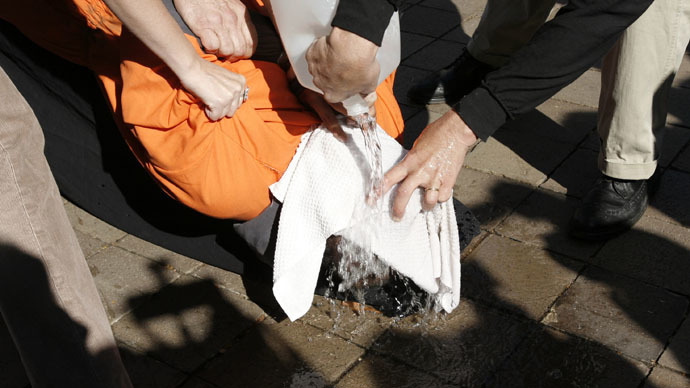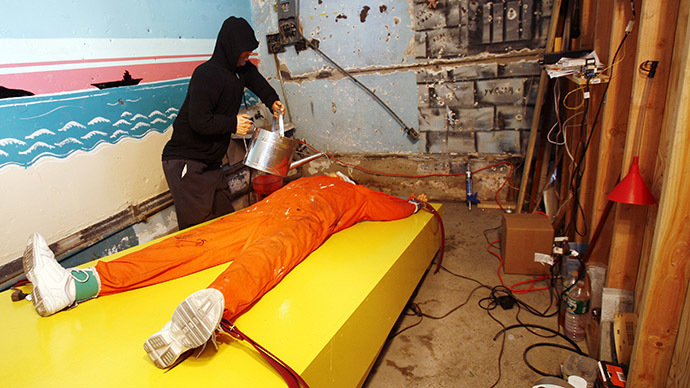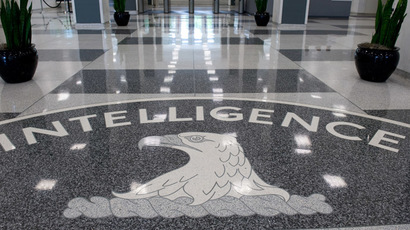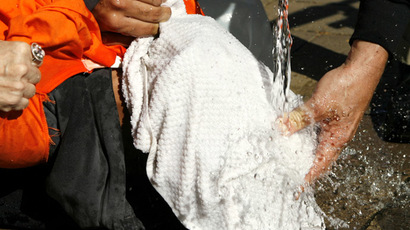‘Didn’t say that’ Psaki ducks CIA torture report delay issues
The potential ISIS reaction is a factor in the release of the CIA torture report, the State Department spokeswoman said. Commenting on Secretary of State John Kerry’s request to delay the report, Jen Psaki told RT “That's not exactly what we said.”
READ MORE: Bush blasts CIA torture report even before its release
RT’s Gayane Chichakyan was among the reporters grilling the State Department spokesperson on the recent reports that Kerry called the Chair of the Senate Committee on Intelligence, Sen. Dianne Feinstein (D-Calif.), asking her to even further delay the release of the document detailing on the Central Intelligence Agency’s so-called “enhanced interrogation techniques.”
Psaki said Kerry was referring to the “foreign policy priorities”of the report’s timing, hinting that the publication of report could lead to global outrage against the US. She also highlighted Islamic State’s (IS, previously ISIS/ISIL) possible reactions as a concern. However, the spokesperson denied that State Department’s intention was to delay the long-overdue paper, which is now scheduled to be released this week.
Here is the full exchange between RT’s Chichakyan and Psaki on the issue.
Gayane Chichakyan:Torture report – the State Department thinks the timing isn’t right about the release. What’s not right about the timing?
Jen Psaki: That’s not exactly what we said, nor have we ever said that publicly. I think you’re referring to reports of a phone call --
GC:That’s right.
JP: between the Secretary and Senator Feinstein. And during that call, which he made on Friday, he not only reiterated the support of the Administration and his own support for the release of the report, but he also made clear that, of course, the timing is her choice. The fact is that there’s quite a bit going on in the world, and he wanted to have a discussion with a former colleague, somebody he worked with for decades in the Senate, about foreign and policy implications of the release of the report, ongoing efforts – everything from our ongoing efforts related to ISIL, the safety of Americans being held hostage around the world, and he was simply having a discussion about the impact that the release will have on those factors.

GC:Do you think a few days would matter, really, in this case? Because the Senate doesn’t have much time left and --
JP: It’s a good question. He didn’t discuss a specific proposed time or anything along those lines. He was simply raising the fact that these are issues that are ongoing right now and certainly wanted to have a discussion and make sure that they were factored into the timing.
GC:In a Republican-controlled Senate, the report may not be published at all. Would the Administration risk not having it published at all?
JP: Well, as you know, there’s a lot of politics that happen – happens in the Senate and Congress, and certainly I can’t make a prediction of that. I would leave that to colleagues who speak for those on the Hill. We continue to support the release – the Secretary does, the President does, and obviously, as we’ve seen the announcements, that will be happening soon.
READ MORE: John Kerry asks to delay CIA torture report
Matthew Lee of the AP also posed tough questions to Psaki during the briefing, especially around Kerry’s intentions to delay or squash the release of the report.
ML:I was told the White House said that they knew that the call was being made, but nobody really said if the Secretary said, “I want to make this call,” or if the White House said, “Will you make this call.”
JP: Well, he’s the Secretary of State, and oftentimes, he makes proposals, and certainly he worked with Dianne – Senator Feinstein for decades. I’m not going to get into more specifics other than to convey that it was known he was going to make the call; it was a call to discuss, as I described, implications as the Secretary of State on our foreign policy priorities.
ML:On the same subject, why is the release being put off so consistently?
JP: Put off?
ML:Yes, over and – delayed.
JP: Well, I wouldn’t characterize it in that way. As you know, there’s a lot of sensitive information in this report. Obviously, the White House and not us – so I’ll really send you to them – has worked with the committee on redactions and information that can’t be public, and that takes some time. But I would point you to them and point you to the Senate committee for more specifics.
Psaki then denied any knowledge of the closure of Canadian and UK embassies in Egypt’s capital Cairo being in any way connected to the report’s release.

"Unrelated to the announcement by the UK and Canada, and unrelated to any report, we did put out a new travel security message to U.S. citizens late last week in light of heightened tensions and recent attacks against Westerners. I’d certainly point you to the UK and Canada for the reasons for their position – their announcements," she said.
The Senate intelligence committee was planning to publish the report on Tuesday.
The release of the 6,000-page document will reveal details about the CIA's past use of enhanced interrogation techniques. Even though the majority of the findings will not be made available to the public, a partial release could trigger outrage against US torture tactics.
Earlier, Feinstein said that the report "uncovers startling details about the CIA detention and interrogation program and raises critical questions about intelligence operations and oversight.”
According to her, the findings show the CIA undermined "societal and constitutional values that we are very proud of” through the use of tactics like waterboarding and sleep deprivation.














